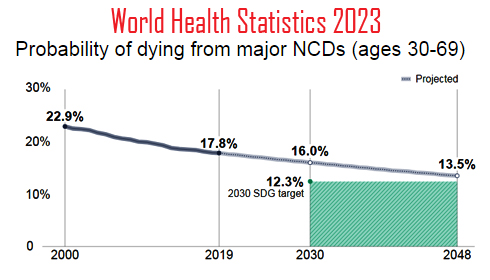
Urgent increased investments needed to put health SDGs back on track: WHO
The latest World Health Statistics report, which includes data up to 2022, and was released on May 19, 2023, in Geneva, has highlighted a slowing of health development on key health indicators in recent years when compared to patterns witnessed from 2000 to 2015, underlining the fact that increased invests in health are needed urgently to put the sustainable development goals (SDG) that suffered setbacks during the COVID pandemic back on track.
The flagship publication of the World Health Organisation (WHO) also raised the issue of the growing threat posed by noncommunicable diseases (NCDs) and climate change and advocated for a more coordinated and robust response.
“World has lost about 337 million life years in just two years,” said Dr Samira Asma, WHO Assistant Director-General for Data, Analytics and Delivery for Impact while introducing the report.
“This equates to an average of 22 years of life lost for every excess death, abruptly and tragically cutting short the lives of millions of people,” she added.
Pointing out that since 2000, the world has seen significant improvements in maternal and child health, with deaths falling by one-third and one-half, respectively, Dr Haidong Wang, Unit head, Monitoring, Forecasting & Inequalities and lead author of the report, said, “The incidence of infectious diseases such as HIV, tuberculosis (TB) and malaria also declined, along with a lowered risk of premature deaths from NCDs and injuries. Together, these contributed to an increase in global life expectancy from 67 years in 2000 to 73 years in 2019.”
The COVID pandemic, however, has thrown several health-related indicators off track, contributing to discrepancies in access to high-quality health care, routine immunisations, and financial security, according to the authors.
“As a result, improving trends in malaria and TB have been reversed, and fewer people were treated for neglected tropical diseases (NTDs),” they added.
“The World Health Statistics is WHO’s annual check-up on the state of the world’s health. The report sends a stark message on the threat of noncommunicable diseases, which take an immense and increasing toll on lives, livelihoods, health systems, communities, economies and societies,” said Dr Tedros Adhanom Ghebreyesus, WHO Director-General.
“The report calls for a substantial increase in investments in health and health systems to get back on track towards the Sustainable Development Goals,” he added.
Also Read:
| - As COVID death falls 95% WHO launches new pandemic preparedness initiative |
The report noted that despite overall health progress, the share of deaths caused annually by NCDs has grown consistently and is now claiming nearly three-quarters of all lives that are lost each year.
If this trend continues, NCDs are projected to account for about 86% of the 90 million annual deaths by mid-century; consequently, 77 million of these will be due to NCDs – a nearly 90% increase in absolute numbers since 2019, it emphasised.
Referring to recent trends, the report noted that issues, including the global maternal mortality ratio must fall by 11.6% per year between 2021 and 2030, while the net reduction in TB incidence from 2015 to 2021 was barely one-fifth of the way to WHO's End TB Strategy's 2025 target.
Despite advances in reducing exposure to many health hazards, including as cigarette use, alcohol use, violence, unsafe water and sanitation, and child stunting, exposure to some dangers, such as air pollution, remains high.
Noting that the prevalence of obesity is rising alarmingly with no immediate sign of reversal, the report further pointed out that expanded access to essential health services has slowed compared to pre-2015 gains, coupled with no significant progress in reducing financial hardship due to healthcare costs, thereby limiting the ability of the global community to achieve Universal Health Coverage by 2030.
“The COVID-19 pandemic is an important reminder that progress is neither linear nor guaranteed,” Dr Asma warned.
“To stay on track towards the 2030 SDG agenda, we must act decisively and collectively to deliver a measurable impact in all countries,” she added.